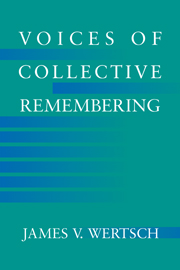Book contents
- Frontmatter
- Contents
- Introduction and Acknowledgments
- 1 An Encounter with Collective Memory
- 2 Methodological Preliminaries to the Study of Collective Remembering
- 3 Collective Memory: A Term in Search of a Meaning
- 4 State Production of Official Historical Narratives
- 5 Narrative Dialogicality and Narrative Templates in the Production of Official Collective Memory
- 6 The Consumption of Historical Narratives
- 7 Generational Differences in Collective Remembering
- Conclusion
- References
- Index
5 - Narrative Dialogicality and Narrative Templates in the Production of Official Collective Memory
Published online by Cambridge University Press: 08 January 2010
- Frontmatter
- Contents
- Introduction and Acknowledgments
- 1 An Encounter with Collective Memory
- 2 Methodological Preliminaries to the Study of Collective Remembering
- 3 Collective Memory: A Term in Search of a Meaning
- 4 State Production of Official Historical Narratives
- 5 Narrative Dialogicality and Narrative Templates in the Production of Official Collective Memory
- 6 The Consumption of Historical Narratives
- 7 Generational Differences in Collective Remembering
- Conclusion
- References
- Index
Summary
In the last chapter, I outlined several general issues about the way modern states seek to control collective remembering. Starting with the observation that social groups presupposememory, I examined some of the motivations and means that states have for producing an official account of the past. The specifics I outlined in connection with the Soviet Union provide an example of how such motivations and means may be taken to an extreme, but they reflect tendencies that exist in one form or another everywhere.
A general point of Chapter 4 was that all states are committed to promulgating an official account of the past. Such accounts typically look more like collective memory than analytical history, and efforts to control collective remembering through the production of textual resources are almost invariably coupled with the tendency to discount or suppress alternative accounts. Furthermore, it is not uncommon for the official accounts to be presented as immutable, even when they are not.
In this chapter, I shall explore some of these issues further by going into more detail about the production of textual resources for collective remembering in Russia. In particular, I shall be concerned with such production during the transition from the Soviet to the post-Soviet era. This setting is unique for several reasons, two of which I shall examine in what follows. The first is related to the “bent twig” phenomenon outlined by Berlin (1991) and concerns the rapidity and scale of change in Russia following the break-up of the USSR. This swift, massive transformation has only a few parallels, and makes Russia a unique natural laboratory for the study of collective memory dynamics.
- Type
- Chapter
- Information
- Voices of Collective Remembering , pp. 87 - 116Publisher: Cambridge University PressPrint publication year: 2002
- 1
- Cited by



